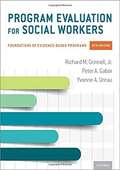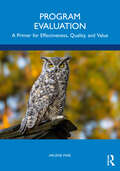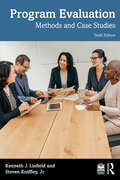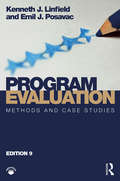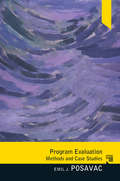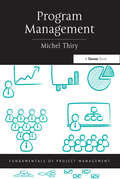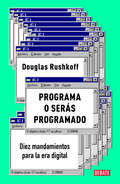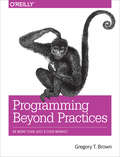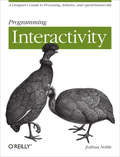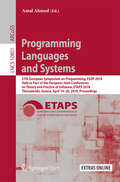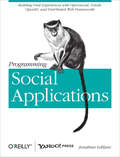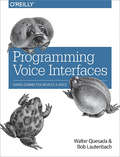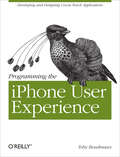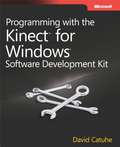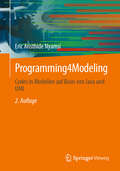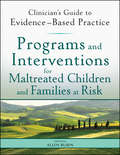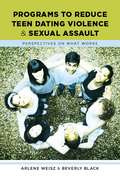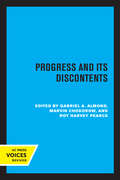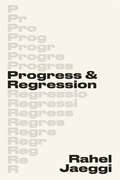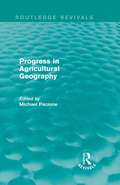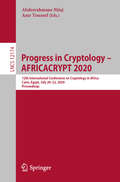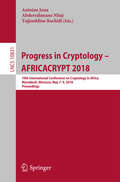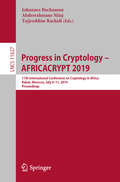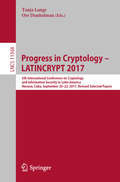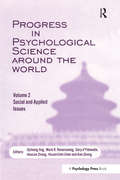- Table View
- List View
Program Evaluation for Social Workers: Foundations of Evidence-Based Programs
by Richard M. Grinnell Yvonne A. Unrau Peter A. GaborOver the course of 20 years and eight editions, the goals of the book have remained the same: to prepare students to participate in evaluative activities within their organizations, become beginning critical producers and consumers of the professional evaluative literature, and reap the benefits of more advanced evaluation courses and texts. <p><p> The authors aim to meet these objectives by presenting a unique approach that is realistic, practical, applied, and user friendly. Unlike other textbooks on the market, Program Evaluation for Social Workers presents both program-level evaluation and case-level evaluation methods; assuming that neither of these two distinct approaches alone adequately reflects the realities of the field, the book demonstrates how they can instead complement each other. This integration of approaches provides an accessible, adaptable, and realistic framework for students and beginning practitioners to more easily grasp and implement in the real world.
Program Evaluation: A Primer for Effectiveness, Quality, and Value
by Arlene FinkThis timely, unique, and insightful book provides students and practitioners with the tools and skills needed to evaluate social and policy programs across a range of disciplines—from public health to social work to education—enabling the allocation of scarce human and financial resources to advance the health and well-being of individuals and populations. The chapters are organized according to the main tasks involved in conducting an evaluation to produce unbiased evidence of program effectiveness, quality, and value. The chapters include methods for selecting and justifying evaluation questions or hypotheses, designing evaluations, sampling participants, selecting information sources, and ensuring reliable and valid measurement. The final section of the book is focused around managing and analyzing data and transparently reporting the results in written and oral form. The book features international case studies throughout, covers quantitative, qualitative, and mixed-method approaches, and is also informed by new online methods developed during the COVID-19 pandemic. Among the book’s unique features is a focus on international standards for conducting ethical evaluations and avoiding research misconduct. Also featuring checklists, example forms, and summaries of the key ideas and topics, this very practical book is essential reading for students in the social, behavioral, and health sciences, and will be a key resource for professionals in the field.
Program Evaluation: Methods and Case Studies
by Kenneth J. Linfield Steven D. Kniffley, Jr.Now in its tenth edition, this key textbook provides a solid foundation in program evaluation, covering the main components of evaluating agencies and their programs, how best to address these components, and the procedures to follow when conducting evaluations. Different models and approaches are paired with practical techniques, such as how to plan an interview to collect qualitative data and how to use statistical analysis to report results. The newly enhanced MISSION! framework, returned to throughout the book, helps solidify the seven general areas that program evaluators must consider at all times: meeting needs, implementation, stakeholders, side effects, improvement focus, outcomes, nuances, and underpinning everything, a consideration of diversity and equity.Key features of this new edition include: Emphasis on culturally responsive approaches to evaluation, equipping students with the skills needed to foster inclusivity, social justice, and collaboration in their program evaluations A focus on real-world preparation, with a rich variety of case studies introduced into every chapter, along with videos from case study evaluators providing a vital insight into the actual practice of program evaluation Accompanied by a rich variety of instructor and student resources, including contributions from expert program evaluators, and taking a student-centred approach from the beginning, this is an essential resource for undergraduate and graduate students of program evaluation.
Program Evaluation: Methods and Case Studies (Mysearchlab Series 15% Off Ser.)
by Emil J. Posavac Kenneth J. LinfieldThis text provides a solid foundation in program evaluation, covering the main components of evaluating agencies and their programs, how best to address those components, and the procedures to follow when conducting evaluations. Different models and approaches are paired with practical techniques, such as how to plan an interview to collect qualitative data and how to use statistical analyses to report results. In every chapter, case studies provide real world examples of evaluations broken down into the main elements of program evaluation: the needs that led to the program, the implementation of program plans, the people connected to the program, unexpected side effects, the role of evaluators in improving programs, the results, and the factors behind the results. In addition, the story of one of the evaluators involved in each case study is presented to show the human side of evaluation. This new edition also offers enhanced and expanded case studies, making them a central organizing theme, and adds more international examples. New online resources for this edition include a table of evaluation models, examples of program evaluation reports, sample handouts for presentations to stakeholders, links to YouTube videos and additional annotated resources. All resources are available for download under the tab eResources at www.routledge.com/9781138103962.
Program Evaluation: Methods and Case Studies (Mysearchlab Series 15% Off Ser.)
by Emil PosavacComprehensive yet accessible, this text provides a practical introduction to the skills, attitudes, and methods required to assess the worth and value of human services offered in public and private organizations in a wide range of fields. Students are introduced to the need for such activities, the methods for carrying out evaluations, and the essential steps in organizing findings into reports. The text focuses on the work of people who are closely associated with the service to be evaluated, and is designed to help program planners, developers, and evaluators to work with program staff members who might be threatened by program evaluation.
Program Management (Fundamentals of Project Management)
by Michel ThiryProgram management (PgM) is fast developing as the essential link between strategy and projects and as a vehicle for organizational change. It offers the means to manage groups of projects with a common business purpose in an integrated and effective way. The Second Edition of Michel Thiry’s Program Management builds on the bestselling title first published in 2010. The heavily revised text reflects the latest program management guides and international standards and includes: a new section on agile management in programs; the author’s own program management maturity measure; a new section on change management, which is now integral to many programs. Michel has also reviewed and revised the program lifecycle to align with the more unified view of program management that has emerged since the book was first published. The result is an essential guide to program management that incorporates a robust theoretical framework, complemented by examples and advice from one of the world’s leading practitioners.
Programa o serás programado: Diez mandamientos para la era digital
by Douglas RushkoffDiez mandamientos para la era digital. El debate sobre si la red es buena o mala es irrelevante: la red está aquí para quedarse y si bien somos cada vez más conscientes de los muchos problemas que ha engendrado la era digital, lo que se requiere ahora es una respuesta humana a la evolución de estas tecnologías. Para Rushkoff es imprescindible empezar a codificar los cambios por los que estamos pasando y desarrollar un nuevo patrón ético, comportamental y comercial para guiarnos. Estamos viviendo un cambio de paradigma real y sin embargo tenemos escasa comprensión de lo que nos ocurre y de cómo superarlo. La verdadera pregunta que debemos plantearnos es, ¿dirigimos la tecnología, o nos dejamos dirigir por ella y aquellos que la han dominado? En el paisaje altamente programado en el que vivimos podemos crear el software o podemos ser el software; programar o ser programados. Hasta ahora, nos hemos limito a ser programados. Eneste pequeño y valioso libro Rushkoff ofrece tanto a los entusiastas cibernéticos como a los tecnófobos las pautas para navegar en este nuevo universo digital y recuperar el control de nuestras vidas.
Programming Beyond Practices: Be More Than Just a Code Monkey
by Gregory T BrownWriting code is the easy part of your work as a software developer. This practical book lets you explore the other 90%—everything from requirements discovery and rapid prototyping to business analysis and designing for maintainability. Instead of providing neatly packaged advice from on high, author Gregory Brown presents detailed examples of the many problems developers encounter, including the thought process it takes to solve them.He does this in an unusual and entertaining fashion by making you the main character in a series of chapter-length stories. As these stories progress, the examples become more complex, and your responsibilities increase. Together, these stories take you on a journey that will make you question and refine the way you think about, and work on, software projects.Steps in this unique journey include:Using prototypes to explore project ideasSpotting hidden dependencies in incremental changesIdentifying the pain points of service integrationsDeveloping a rigorous approach towards problem-solvingDesigning software from the bottom upData modeling in an imperfect worldGradual process improvement as an antidote for over-commitmentThe future of software development
Programming Interactivity: A Designer's Guide to Processing, Arduino, and Openframeworks
by Joshua NobleMake cool stuff. If you're a designer or artist without a lot of programming experience, this book will teach you to work with 2D and 3D graphics, sound, physical interaction, and electronic circuitry to create all sorts of interesting and compelling experiences -- online and off.Programming Interactivity explains programming and electrical engineering basics, and introduces three freely available tools created specifically for artists and designers:Processing, a Java-based programming language and environment for building projects on the desktop, Web, or mobile phonesArduino, a system that integrates a microcomputer prototyping board, IDE, and programming language for creating your own hardware and controlsOpenFrameworks, a coding framework simplified for designers and artists, using the powerful C++ programming languageBTW, you don't have to wait until you finish the book to actually make something. You'll get working code samples you can use right away, along with the background and technical information you need to design, program, build, and troubleshoot your own projects. The cutting edge design techniques and discussions with leading artists and designers will give you the tools and inspiration to let your imagination take flight.
Programming Languages and Systems: 27th European Symposium On Programming, Esop 2018, Held As Part Of The European Joint Conferences On Theory And Practice Of Software, Etaps 2018, Thessaloniki, Greece, April 14-20, 2018, Proceedings (Lecture Notes in Computer Science #10801)
by Amal AhmedThis open access book constitutes the proceedings of the 27th European Symposium on Programming, ESOP 2018, which took place in Thessaloniki, Greece in April 2018, held as Part of the European Joint Conferences on Theory and Practice of Software, ETAPS 2018. The 36 papers presented in this volume were carefully reviewed and selected from 114 submissions. The papers are organized in topical sections named: language design; probabilistic programming; types and effects; concurrency; security; program verification; program analysis and automated verification; session types and concurrency; concurrency and distribution; and compiler verification.
Programming Social Applications: Building Viral Experiences with OpenSocial, OAuth, OpenID, and Distributed Web Frameworks
by Jonathan LeBlancSocial networking has made one thing clear: websites and applications need to provide users with experiences tailored to their preferences. This in-depth guide shows you how to build rich social frameworks, using open source technologies and specifications. You'll learn how to create third-party applications for existing sites, build engaging social graphs, and develop products to host your own socialized experience.Programming Social Apps focuses on the OpenSocial platform, along with Apache Shindig, OAuth, OpenID, and other tools, demonstrating how they work together to help you solve practical issues. Each chapter uncovers a new layer in the construction of highly viral social applications and platforms.Learn how to build applications on top of social containers, and leverage existing user dataMap user relationships with a social graph, and extend social links between usersCustomize your application with user profile information and encourage growth through friendshipsBuild a scalable social application container with OpenSocial and ShindigDive into advanced OpenSocial topics such as templating and data pipelining methodsProtect your container and its users against malicious code
Programming Voice Interfaces
by Walter Quesada Bob LautenbachGet a step-by-step guide for developing voice interfaces for applications and devices connected to the Internet of Things. By allowing consumers to use natural human interactions, you can avoid awkward methods of input and interactivity to provide them with elevated user experiences. This practical book is ideal for software engineers who build applications for the Web, smartphones, as well as embedded systems that dominate the IoT space.Integrate voice interfaces with internet connected devices and sensorsLearn how to integrate with existing voice interfacesUnderstand when to use a voice over other Natural User Interface technologiesBuild a prototype with tools such as Raspberry Pi, solderless breadboards, jumper cables, sensors, Arduino, Visual Studio, and other toolsUse cloud services such as Azure and AWS to integrate voice with your existing or new web service end-points
Programming the iPhone User Experience: Developing and Designing Cocoa Touch Applications
by Toby BoudreauxApple's iPhone and iPod Touch not only feature the world's most powerful mobile operating system, they also usher in a new standard of human-computer interaction through gestural interfaces and multi-touch navigation. This book provides you with a hands-on, example-driven tour of UIKit, Apple's user interface toolkit, and includes common design patterns to help you create new iPhone and iPod Touch user experiences. Using Apple's Cocoa Touch framework, you'll learn how to build applications that respond in unique ways when users tap, slide, swipe, tilt, shake, or pinch the screen. Programming the iPhone User Experience is a perfect companion to Apple's Human Interface Guidelines, and provides the practical information you need to develop innovative applications for the iPhone and iPod Touch, whether you're a CTO, developer, or UI/UX designer.Understand the basics of the Cocoa Touch framework for building iPhone and iPod Touch applications Learn theory and best practices for using Cocoa Touch to develop applications with engaging and effective user interfaces Apply your knowledge of Objective-C to the iPhone/iPod Touch framework Customize standard UIKit views according to Apple's Human Interface Guidelines and usability principles Learn patterns for handling user experience concerns outside of the interface, such as network- and location-awareness
Programming with the KinectTM for Windows® Software Development Kit
by David Catuhe<p>Create rich experiences for users of Windows 7 and Windows 8 Developer Preview with this pragmatic guide to the Kinect for Windows Software Development Kit (SDK).</p>
Programming4Modeling: Codes in Modellen auf Basis von Java und UML
by Eric Aristhide NyamsiDas Buch fokussiert auf objektorientierte Softwareentwicklung in Bezug auf das Konzept „Programming4Modeling“ genannt „P4M“. Es stellt zum einen die Analyse und Design für die Modellierung mit UML und zum anderen die Softwareentwicklung mit Java dar. Das Buch wirft folgende Fragen auf: Wie ist die Architektur eines Klassenmodells? Welche Codes ermöglichen eine effiziente Softwareentwicklung? Was sind die Schnittpunkte von Codes und Modellen?
Programs and Interventions for Maltreated Children and Families at Risk
by Allen RubinEvidence-based interventions are increasingly being required by third-party payers and an evidence-based orientation has come to define ethical practice. This compendium of short, how-to chapters focuses on the programs and interventions to prevent child maltreatment that have the best scientific evidence supporting their effectiveness. Interventions and programs discussed include Cognitive Behavioral Therapy, EMDR, Multisystemic Therapy, Coping Cat, and many more. Busy practitioners will appreciate this book's implementation of evidence-based practices by providing the practical and "what now" rather than using the typical academic approach.
Programs to Reduce Teen Dating Violence and Sexual Assault: Perspectives on What Works
by Arlene Weisz Beverly BlackArlene Weisz and Beverly Black interview practitioners from more than fifty dating violence and sexual assault programs across the United States to provide a unique resource for effective teen dating violence prevention. Enhancing existing research with the shared wisdom of the nation's prevention community, Weisz and Black describe program goals and content, recruitment strategies, membership, structure, and community involvement in practitioners' own words. Their comprehensive approach reveals the core techniques that should be a part of any successful prevention program, including theoretical consistency, which contributes to sound content development, and peer education and youth leadership, which empower participants and keep programs relevant.Weisz and Black show that multisession programs are most useful in preventing violence and assault, because they enable participants to learn new behaviors and change entrenched attitudes. Combining single- and mixed-gender sessions, as well as steering discussions away from the assignment of blame, also yield positive results. The authors demonstrate that productive education remains sensitive to differences in culture and sexual orientation and includes experiential exercises and role-playing. Manuals help in guiding educators and improving evaluation, but they should also allow adolescents to direct the discussion. Good programs regularly address teachers and parents. Ultimately, though, Weisz and Black find that the ideal program retains prevention educators long after the apprentice stage, encouraging self-evaluation and new interventions based on the wisdom that experience brings.
Progress and Its Discontents
by Roy Harvey Pearce Garry R. Marvin Gabriel A. AlmondEvents of the past two decades have challenged many of the fundamental beliefs, institutions, and values of modern western culture--the culture of "progress." Are science and technology really progressive and beneficial? Have they led to the enhancement of welfare, greater hapiness, and moral immprovement? I s the continued growth of material productivity possible? Desirable? Are the institutions of progress viable?Progress and Its Discontents assembles the views on progress of some of America's leading humanists, scientists, and social scientists. Citing disappointed expectations of progress in spheres from science to morals and politics, and the many problems created or left untouched by progress, the editors conclude that the term no longer refers to "an inevitable sequence of improvements" but rather to "an aspiration and compelling obligation." Contributors: Nannerl O. Keohane Georg G. Iggers Alfred G. Meyer Crawford Young Francisco J. Ayala John T. Edsall Gerald Fenberg Bernard D. Davis Gerald Holton Marc J. Roberts H. Stuart Hughes Moses Abramovitz Harvey Brooks Nathan Rosenberg Hollis B. Chenery Gianfranco Poggi Aaron Wildavsky G. Bingham Powell, Jr. Samuel H. Barnes Steven Marcus Murray Krieger Robert C. Elliott Martin E. Marty Daniel Bell Frederick A. Olafson This title is part of UC Press's Voices Revived program, which commemorates University of California Press’s mission to seek out and cultivate the brightest minds and give them voice, reach, and impact. Drawing on a backlist dating to 1893, Voices Revived makes high-quality, peer-reviewed scholarship accessible once again using print-on-demand technology. This title was originally published in 1982.
Progress and Regression
by Rahel JaeggiDespite widespread technological innovation, scientific and medical breakthroughs, and strides toward gender and racial equity, few believe that humanity is on the road of progress. Indeed, many are increasingly skeptical of the very notion of progress, seeing it as the stuff of hollow political speeches.Nevertheless, this impassioned book argues that we are lost without a shared idea of progress. In the tradition of critical theory, Rahel Jaeggi defends a vision of progress that avoids Eurocentric and teleological distortions. Progress here is not an inevitable developmental trend but a kind of compass directing society’s never-ending journey toward emancipation. A nimble practitioner of dialectical reasoning, Jaeggi revitalizes progress by confronting its opposite: regression. Her analysis—sober and thoughtful, but urgent—reckons with the myriad signs of regression today, including growing inequality, ecological destruction, and above all the assault on educational institutions, critical thinking, and reason itself.The task of imagining a human solidarity capable of transcending difference and promoting universal welfare has seldom been more pressing—or more complex. Progress and Regression is an indispensable resource for those ready to take up the challenge.
Progress in Agricultural Geography (Routledge Revivals)
by Michael PacioneIn the second half of the twentieth century, significant changes were occurring within the agricultural industry, including an increase in efficiency and government intervention, as well as expanded and more complicated patterns of trade. This comprehensive volume, first published in 1986, reflects how these developments challenged the field of agricultural geography. Considering agricultural innovations, farming systems, government policy and land ownership, this title provides an essential background to students with an interest in agricultural methods, distribution and reform.
Progress in Cryptology - AFRICACRYPT 2020: 12th International Conference on Cryptology in Africa, Cairo, Egypt, July 20 – 22, 2020, Proceedings (Lecture Notes in Computer Science #12174)
by Abderrahmane Nitaj Amr YoussefThis book constitutes the refereed proceedings of the 12th International Conference on the Theory and Application of Cryptographic Techniques in Africa, AFRICACRYPT 2020, held in Cairo, Egypt, in July 2020. The 21 papers presented in this book were carefully reviewed and selected from 49 submissions. The papers are organized in topical sections on zero knowledge, symmetric key cryptography, elliptic curves, post quantum cryptography, lattice based cryptography, side channel attacks, cryptanalysis and new algorithms and schemes. AFRICACRYPT is a major scientific event that seeks to advance and promote the field of cryptology on the African continent. The conference has systematically drawn some excellent contributions to the field. The conference has always been organized in cooperation with the International Association for Cryptologic Research (IACR).
Progress in Cryptology – AFRICACRYPT 2018: 10th International Conference On Crytology In Africa, Marrakesh, Morocco, May 7-9, 2018, Proceedings (Lecture Notes in Computer Science #10831)
by Abderrahmane Nitaj Tajjeeddine Rachidi Antoine JouxThis book constitutes the refereed proceedings of the 10th International Conference on the Theory and Application of Cryptographic Techniques in Africa, AFRICACRYPT 2018, held in Marrakesh, Morocco, in May 2018. The 19 papers presented in this book were carefully reviewed and selected from 54 submissions. AFRICACRYPT is a major scientific event that seeks to advance and promote the field of cryptology on the African continent. The conference has systematically drawn some excellent contributions to the field. The conference has always been organized in cooperation with the International Association for Cryptologic Research (IACR).
Progress in Cryptology – AFRICACRYPT 2019: 11th International Conference on Cryptology in Africa, Rabat, Morocco, July 9–11, 2019, Proceedings (Lecture Notes in Computer Science #11627)
by Johannes Buchmann Abderrahmane Nitaj Tajjeeddine RachidiThis book constitutes the refereed proceedings of the 11th International Conference on the Theory and Application of Cryptographic Techniques in Africa, AFRICACRYPT 2019, held in Rabat, Morocco, in July 2019. The 22 papers presented in this book were carefully reviewed and selected from 53 submissions. The papers are organized in topical sections on protocols; post-quantum cryptography; zero-knowledge; lattice based cryptography; new schemes and analysis; block ciphers; side-channel attacks and countermeasures; signatures. AFRICACRYPT is a major scientific event that seeks to advance and promote the field of cryptology on the African continent. The conference has systematically drawn some excellent contributions to the field. The conference has always been organized in cooperation with the International Association for Cryptologic Research (IACR).
Progress in Cryptology – LATINCRYPT 2017: 5th International Conference on Cryptology and Information Security in Latin America, Havana, Cuba, September 20–22, 2017, Revised Selected Papers (Lecture Notes in Computer Science #11368)
by Orr Dunkelman Tanja LangeThis book constitutes the refereed post-conference proceedings of the 5th International Conference on Cryptology and Information Security in Latin America, LATINCRYPT 2017, held in Havana, Cuba, in September 2017.The 20 papers presented were carefully reviewed and selected from 64 submissions. They are organized in the following topical sections: security protocols; public-key implementation; cryptanalysis; theory of symmetric-key cryptography; multiparty computation and privacy; new constructions; and adversarial cryptography.
Progress in Psychological Science Around the World. Volume 2: Proceedings of the 28th International Congress of Psychology
by Qicheng Jing, Mark R. Rosenzweig, Géry d’Ydewalle, Houcan Zhang, Hsuan-Chih Che, and Kan ZhangProgress in Psychological Science around the World, Volumes 1 and 2, present the main contributions from the 28th International Congress of Psychology, held in Beijing in 2004. These expert contributions include the Nobel laureate address, the Presidential address, and the Keynote and State-of-the-Art lectures. They are written by international leaders in psychology from 25 countries and regions around the world. The authors present a variety of approaches and perspectives that reflect cutting-edge advances in psychological science. This second volume builds on the coverage of neural, cognitive, and developmental issues from the first volume, to address social and applied issues in modern psychology. The topics covered include: educational psychology and measurement, health psychology, and social and cultural psychology. Organizational, applied, and international psychology are also discussed. Progress in Psychological Science around the World, with its broad coverage of psychological research and practice, and its highly select group of world renowned authors, will be invaluable for researchers, professionals, teachers, and students in the field of psychology.
